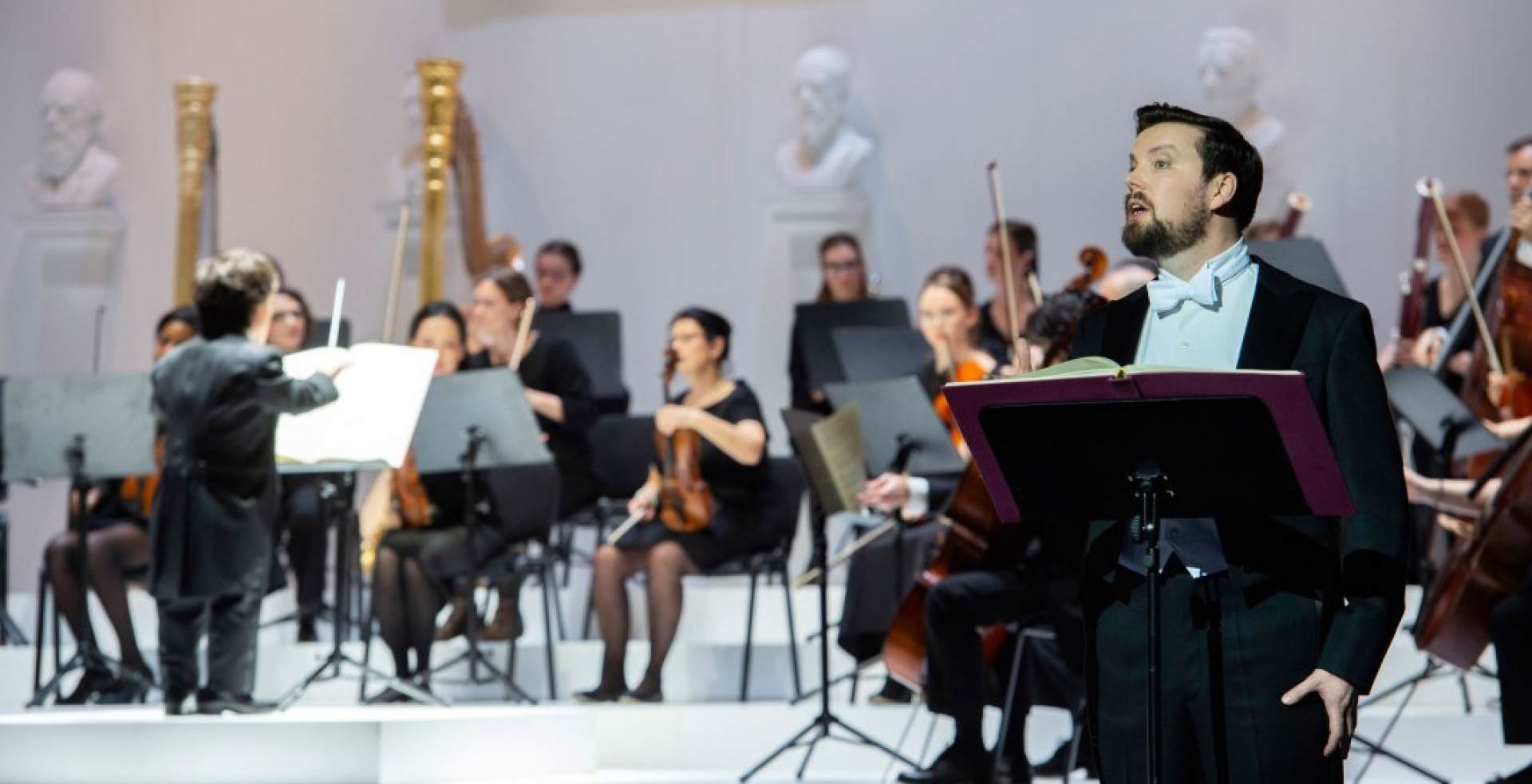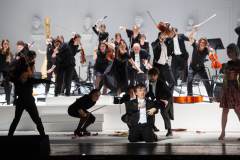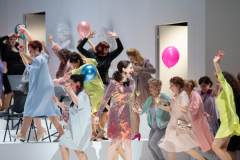The Dwarf
Mo | Tu | We | Th | Fr | Sa | Su |
Der Zwerg (The Dwarf) - Alexander von Zemlinsky (1871 – 1942)
Opera in one act
Libretto by Georg C. Klaren, based on Oscar Wilde's „The Birthday of the Infanta“
First performed on 28th May, 1922 in Cologne
Premiered at the Deutsche Oper Berlin on 24th March, 2019
Recommended for ages 14 and up.
It’s Princess Donna Clara’s 18th birthday and she’s getting showered with presents from all sides, but one gift in particular, from the Turkish Sultan, stands out from the crowd: a real-life dwarf! Amidst all the splendour and beauty the misshapen man attracts her special attention, charming her with his singing and fascinating her all the more for seeming to be blissfully unaware of his physical appearance. The dwarf falls madly in love with the princess and is blind to the coquettish game that she is playing. But then he comes face-to-face with his reflection for the first time in his life. Realising the truth of his situation, he falls down dead. Alexander Zemlinsky’s THE DWARF is based on Oscar Wilde’s fairy tale “The Birthday of the Infanta” and received its world premiere in 1922. Following Zemlinsky’s death in 1942 in American exile the work quickly slipped from public awareness, not to be rediscovered until the 1970s. Since then it has been drawing crowds as a subtle, vibrant seismogram of a highly complex and psychological constellation.
With THE DWARF, Alexander von Zemlinsky came to terms with his traumatic love affair with Alma Schindler, who had left him, a relatively short and outwardly unattractive man, to marry Gustav Mahler. In his production, director Tobias Kratzer has not dealt with this autobiographical background to the opera in this way, but has staged the piece as a modern fairy tale about the birthday of a rich, spoilt and ruthless daughter from a wealthy family. However, he prefaced Zemlinsky's one-act opera with a prologue. This contains the orchestral piece "Begleitungsmusik zu einer Lichtspielszene" by Arnold Schönberg, who was a student of Zemlinsky and later married Zemlinsky's sister Mathilde. Schönberg's orchestral piece was written to accompany a silent film yet to be shot - and becomes the soundtrack to a piano lesson between Zemlinsky and his pupil and later lover Alma, which also tells the story of their brief and passionate relationship.
Program and cast
As a prologue
Arnold Schönberg (1874 – 1951)
Begleitungsmusik zu einer Lichtspielscene für Orchester op. 34 (1930)
Duration: 1 hr 30 mins / no interval
In German language with German and English surtitles
Pre-performance lecture (in German): 45 minutes prior to each performance
Cast
Conductor: Sir Donald Runnicles
Director: Tobias Kratzer
Stage design, Costume design: Rainer Sellmaier
Chorus Master: Jeremy Bines
Light: Stefan Woinke
Dramaturge: Sebastian Hanusa
Donna Clara: Elena Tsallagova
Ghita: Felicia Moore
Der Zwerg: David Butt Philip
Der Zwerg (actor): Mick Morris Mehnert
Don Estoban: Philipp Jekal
Maid 1: Sua Jo
Maid 2: Arianna Manganello
Maid 3: Stephanie Wake-Edwards
1st Companion: Stephanie Lloyd, Carolina Dawabe Valle (07.12.2024)
2nd Companion: Kristina Griep, Margarita Greiner (07.12.2024)
Alma Schindler (Pianist): Adelle Eslinger-Runnicles
Alexander von Zemlinsky (Pianist): Evgeny Nikiforov
Chorus: Chor der Deutschen Oper Berlin
Orchestra: Orchester der Deutschen Oper Berlin
Deutsche Oper Berlin
The Deutsche Oper Berlin is an opera company located in the Charlottenburg district of Berlin, Germany. The resident building is the country's second largest opera house and also home to the Berlin State Ballet.
The company's history goes back to the Deutsches Opernhaus built by the then independent city of Charlottenburg—the "richest town of Prussia"—according to plans designed by Heinrich Seeling from 1911. It opened on November 7, 1912 with a performance of Beethoven's Fidelio, conducted by Ignatz Waghalter. After the incorporation of Charlottenburg by the 1920 Greater Berlin Act, the name of the resident building was changed to Städtische Oper (Municipal Opera) in 1925.
Deutsches Opernhaus, 1912
With the Nazi Machtergreifung in 1933, the opera was under control of the Reich Ministry of Public Enlightenment and Propaganda. Minister Joseph Goebbels had the name changed back to Deutsches Opernhaus, competing with the Berlin State Opera in Mitte controlled by his rival, the Prussian minister-president Hermann Göring. In 1935, the building was remodeled by Paul Baumgarten and the seating reduced from 2300 to 2098. Carl Ebert, the pre-World War II general manager, chose to emigrate from Germany rather than endorse the Nazi view of music, and went on to co-found the Glyndebourne opera festival in England. He was replaced by Max von Schillings, who acceded to enact works of "unalloyed German character". Several artists, like the conductor Fritz Stiedry or the singer Alexander Kipnis followed Ebert into emigration. The opera house was destroyed by a RAF air raid on 23 November 1943. Performances continued at the Admiralspalast in Mitte until 1945. Ebert returned as general manager after the war.
After the war, the company in what was now West Berlin used the nearby building of the Theater des Westens until the opera house was rebuilt. The sober design by Fritz Bornemann was completed on 24 September 1961. The opening production was Mozart's Don Giovanni. The new building opened with the current name.

 EN
EN DE
DE IT
IT FR
FR ES
ES RU
RU JP
JP RO
RO
 Seating plan
Seating plan 


